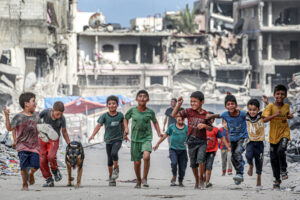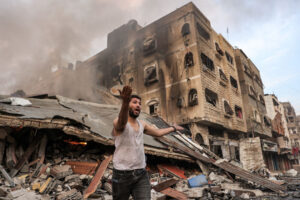Just as they do in England, Gaza’s Christians normally celebrate Christmas with a special meal. It might be stuffed lamb or chicken, with a rich array of salads, vegetable stews, flatbreads and fragrant rice. Their traditional dessert is burbara, a creamy porridge made from wheat, spices and fennel seeds, scattered with nuts and dried fruit. Christians here also decorate their home with trees and lights, and give out homemade sweets to children living nearby.
But this year, like last year, there are no decorations, and almost nothing to buy in the shops. Meat is difficult to find and extremely expensive. After more than 14 months of this seemingly endless war, there is very little to celebrate: for Muslims and Christians alike. I am Muslim, but we are all “people of the book” — and relations between our communities have always been characterised by warmth and respect. And now, especially, we are united, by hunger and hardship and death, without a future whatever our faiths.
A few years ago, a farmer’s spade struck something hard as he tilled his land west of the Nuseirat refugee camp. It was the start of an amazing discovery: beneath the sand lay the monastery of St Hilarion, which dates back to 340 AD and has become a major archaeological site. Hilarion was born and spent much of his life in what is now the Gaza Strip. He began the process of converting its inhabitants from paganism, the dawn of a local Christian community that remains among the oldest on earth.
In 1967, when Israel occupied Gaza at the end of the Six Day War, there were still some 7,000 Christians here. Their numbers have since fallen to barely 1,000, and now represent a blend of Catholics and Orthodox. Some have emigrated to the West, others to the West Bank or other Arab countries. But small as the community has become, it continues to enjoy an outsized cultural presence. Christians have tended to be better educated than the Palestinian average, partly because of excellent religious schools.
When Hamas overthrew the Palestinian Authority in 2007, there were fears that the relationship between Muslims and Christians would deteriorate, and that they might be persecuted. Fortunately, these worries proved baseless. Hamas understood that Christians shared the same challenges as their Muslim peers, united by the same enemy.
Nowhere was this clearer than at Christmas. Whether Catholic or Orthodox, each Gazan Christian treated the birth of Christ as a great celebration. Many times, I saw Muslims joining in, dressed in their smartest clothes, inside churches brilliantly lit by candles. All the while, choirs sang “Silent Night” between readings from the Gospels. Just as in the West, meanwhile, children’s events and parties would feature appearances from Father Christmas, with Santa’s usual red suit and white beard.
When Hamas launched the October 7 attacks, none of Gaza’s Christians took part. Yet the subsequent experiences of Emad Sayegh would surely be familiar to any Gazan. A week after the assault, Israel told the 61-year-old businessman that he had to leave his home. The area, he was told, was about to be targeted by airstrikes. “There were 11 of us,” Sayegh remembers, “so we hurried to the St Porphyrios church in the Old City. We were afraid, but we found a lot of people there — about 400, most of them Christians, but also 19 Muslim families.”
They may have been among friends, but the situation was desperate. Without enough beds, people slept wherever they could: in rooms, alcoves in the walls and corridors. “I spent four nights trying to sleep upright in a chair,” Sayegh says, “so I was exhausted.” Food was in short supply too. Each day, families had to share a single loaf of bread, alongside a small portion of cooked food. And though water was available from a nearby well, it could only be pumped with a generator — a machine that required expensive fuel to run.
Worse was to follow. On 19 October, 12 days into the war, the church was hit. “The Israelis killed 18 people and injured dozens,” Sayegh says. “We were afraid the killing would continue.”
A few days later, the Israelis told everyone still taking refuge at St Porphyrios to evacuate and move south, where they would have to live in tents. Sayegh says at first they refused, but then a tank shell struck the wall of the church, wrecking a room where four of his sons had been sitting two minutes earlier. At the same time, Sayegh discovered that his nearby metalwork factory had also been destroyed. Like others sheltering in the church, he finally decided to leave.
Also staying at St Porphyrios was a man called George, who asked me not to publish his surname. “The bombing was violent and intense, like an earthquake,” he says. For the moment, he and his family are back there, trying to survive inside its Latin Patriarchate school. That isn’t easy: there are no bedrooms, bathrooms or blankets.
“In earlier years,” he says, “we used to light the church candles and hold prayers on Christmas Eve, visit family and friends and go out to celebrate. Now sadness dominates the atmosphere inside the church, as it does outside. There is no room for joy.”
Other Christian sites have also been destroyed. They include both the ancient Caeserea market, and the Orthodox cultural centre, site of all those workshops and lectures. “Christmas will be just another sad day,” says Elias el-Jelda, who used to help run the centre as a member of the Arab Orthodox church council. “I believe Christ is grieving with us.”
Muslims like me feel much the same. Earlier this month, my brother’s house was badly damaged when the Israelis bombed a nearby mosque — the fifth time it’s been struck since the war began. My brother’s daughters were also injured, and earlier this year his son was killed in Rafah.
Like Gaza’s Christians, none of us has ever belonged to a militant faction. None of us are combatants. For many years, my brother happily commuted from Gaza to Israel, where he worked in construction. But then Hamas took over, and Israel built the separation barrier. Since then, he has been unemployed.
Elias el-Jelda tells me that, this Christmas, he and other Christians will concentrate on personal prayers, “asking God to stop our suffering, and to bring peace and justice to Gaza and the world.” I will offer the same prayers.
Disclaimer
Some of the posts we share are controversial and we do not necessarily agree with them in the whole extend. Sometimes we agree with the content or part of it but we do not agree with the narration or language. Nevertheless we find them somehow interesting, valuable and/or informative or we share them, because we strongly believe in freedom of speech, free press and journalism. We strongly encourage you to have a critical approach to all the content, do your own research and analysis to build your own opinion.
We would be glad to have your feedback.
Source: UnHerd Read the original article here: https://unherd.com/



